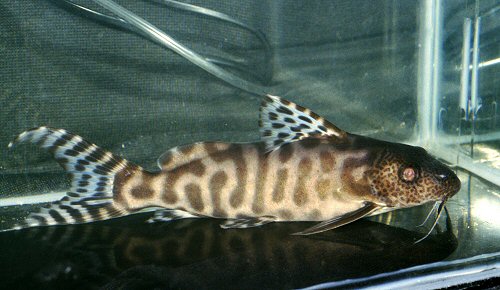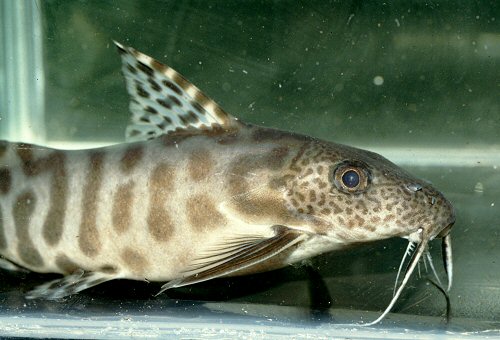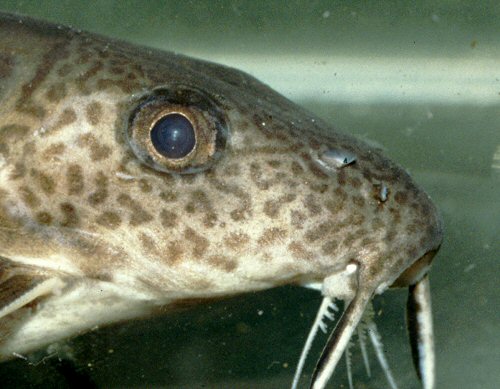SCOTCAT.COM
your internet guide to all things catfish
| What’s In YOUR Water ? Water Changes at the Weekend ? – Not Likely ! |
by Daphne Layley |
If that scenario strikes
a chord with anyone, read on and take note!
Synodontis ornatipinnis
I was quite friendly with a particular local shop, and when they rang and said they had the first two specimens of an unidentified Synodontis, to be imported into this country, I just had to go and see them. They were about 3 inches long and had wide black and white vertical bars along the whole length of their bodies. They were labelled Synodontis “ Zebra ”, and they were absolutely gorgeous. Unfortunately, they had a price tag of £80 each, which was an awful lot of money 26 years ago - probably equivalent to about £400 each by today’s standards. (I should, at this stage, tell you that these fish were eventually named as Synodontis ornatipinnis.) However, our first wedding anniversary was imminent, and my husband offered to buy them as a present. They were installed in a quarantine tank in the kitchen, and they settled down, started eating, and began to look really good. One Friday evening, after I’d had them a couple of weeks, I decided to do a partial water change - about 20%. Those were the days before RO units, De-ionisers and other fancy water-treatment equipment became commonplace – all I had was our mains water supply and a bottle of Haloex, a tapwater conditioner made by Seaquariums, which was excellent at removing chlorine and some other undesirable chemicals. The Haloex was added, the water change was completed – and all seemed well – for just about 2 minutes, after which time, right in front of our eyes, all the skin and flesh peeled off of the bones of these poor fish, just as though they had been dipped in acid. It was like something out of a horror movie – they almost completely dissolved – there was no time to do anything and it was all over in the blink of an eye. I was rooted to the spot in disbelief, staring at what was left of them. Never in my life had I seen anything like it before, and I never want to again. !
Synodontis ornatipinnis
I tearfully rang the Water Board, who had a special number for weekend and out-of-hours emergencies, but I was told to ring the main offices on Monday morning. I remember that rather strange conversation with someone – initially I got the feeling that I wasn’t being taken totally seriously. However, I was deadly serious, and I was mortified at the horrible death of my rare and beautiful fishes – and at the loss of my special anniversary present. I was also hysterically angry and spitting blood to think that some awful fish-killing substance had somehow got into our mains tap water, without our knowledge. It took a long time to uncover the truth, but I was a woman on a mission, and I can be doggedly persistent when necessary. After being transferred to many different people, I eventually found out that every now and again, the water mains suffer from an explosion of Copepods, small crustaceans which, whilst not poisonous, are not altogether desirable. These organisms can be controlled by an insecticide derived from Pyrethrin. It appears that when the “people who make these decisions”, judge that it is necessary, a certain amount of this insecticide is added to the mains. The water mains are then flushed through with this stuff, and the Copepods are temporarily eradicated. I further discovered that these operations, including the addition of any other additives deemed necessary, are normally carried out immediately before a weekend.
Synodontis ornatipinnis - head view
I was finally told that Pyrethrin had, indeed, been added to our mains water just before that very weekend, and that the same operation was carried out several times a year. I remember yelling down the telephone (quite unreasonably, with hindsight) that I was going to sue the Water Board and everyone in it - that I was going to ring the national newspapers and television companies, and write to my MP and anyone else who would listen ! I was apoplectic with anger – how dare they kill my fish ? It was eventually explained to me, by a very patient and long-suffering employee at the other end of the telephone, and I quote, "Madam, we are under contract to supply water which is fit for human consumption, it does not necessarily have to be fit for fish to live in”. I couldn’t believe what I was hearing - water is a fish’s natural environment – of course it’s bl**dy well supposed to be fit for fish to live in! I was too amazed and gob-smacked by this pronouncement to accept their reasoning and, I must admit, 26 years later, it still puzzles me. The water board did offer to add me to their mailing list of people to be notified of future dates when chemicals would be added to the mains, but it was too late for my fish. Very soon after that, we fixed up some plastic guttering around the edge of our conservatory roof, and invested in a couple of non-toxic water butts for rainwater. This was used exclusively for water-changes, up until 3 years ago when we bought an R.O. unit. I don’t know if the Water Board still carries out this procedure – I hope not. Perhaps, after a quarter of a century, their technology has advanced and things are done differently now – I hope so. However, if you’re thinking of doing a water change at the weekend with mains tapwater - unless you’re absolutely sure it’s safe, heed the warning… Photo Credits: Danny Blundell |
If you would like to contribute an article, please e-mail me. You will of course be credited for your work.
If you would like to donate any denomination of money to the site just click the above link button. All proceeds will go to running the site and hopefully to keep it going for a few years yet.
Print or e-mail this article below




